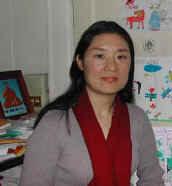12/26/2002
Falun Gong practitioner Amy Lee fled China three years ago to avoid being put in a labor camp. Her dream is to be reunited with her husband and 7-year-old daughter.
In her spare time, Amy Lee, a Falun Gong practitioner who fled China three
years ago to avoid being put in a labor camp, writes letters and makes phone
calls to politicians and law enforcement officials, hoping that her efforts will
one day reunite her with her daughter and husband.
Standing in front of a picture drawn by her 7-year-old daughter which is taped
to her bedroom door, Lee, 35, who now lives in Elmhurst, says she calls her
family every weekend, and her daughter asks her, "How many days before we
get together, Mommy? How many days?"
Though Lee's daughter, Luo Meng Lin, was given approval for a refugee asylum
visa in June, she has not been able to leave China because the Chinese
government has refused to issue her a passport, Lee said.
After calling the Guangzhou police bureau long-distance many times to ask why
her daughter could not get a passport, Lee said one police woman told her that
Falun Gong family members would never receive a passport.
A representative from the Chinese embassy in Washington, D.C. said that in Lee's
daughter's case, it would be up to the local authorities in Guangzhou to issue
her a passport.
"It breaks my heart, you know," said Lee, staring at her daughter's
drawing of a mother and daughter surrounded by fireflies. "So many times
I've dreamed that we are reunited."
Lee said she was first arrested in her native Guangzhou in 1999, after the
Chinese government began cracking down on the spiritual movement known as Falun
Gong, which combines the philosophies derived from Buddhism and Taoism with
special exercises.
Hundreds of practitioners live in Queens and attend regular practice sessions.
Like most other practitioners, Lee practiced Falun Gong because she believed
that it was good for her health and spiritual well-being. When the Chinese
government began denouncing Falun Gong, Lee sent a letter to the local
government saying that Falun Gong was good.
"They put me on a black list, and then they go to your home to push you to
give up Falun Gong," said Lee.
Lee went to Beijing with many other Falun Gong practitioners to appeal for the
right to practice Falun Gong, which the Chinese government has deemed a
"cult" that threatens national stability. She was put in jail for 15
days with no bed or other amenities, and tortured, she said.
"Six policemen hit me to unconsciousness. They hit everybody. They grab
your hair and run from one room to another room," Lee said. "I was
very shocked. I thought, 'This is the Chinese government?' I couldn't believe
that."
After 15 days, Lee said she was transferred to a prison in Guangzhou, where she
was interrogated and asked to write down the names of other fellow
practitioners. When her daughter and husband came to visit, she was told she
could go home with her family if she answered some questions, but she would be
put in jail if she refused.
"I refused. I said, 'They are good practitioners. Why do you want to arrest
them?' " Lee said.
From June until July 2001, Lee said she was put into a "brainwash
class," where she was repeatedly shown videos saying that Falun Gong is
evil, and that Falun Gong practitioners kill themselves.
After she was released, Lee said she was put under 24-hour police surveillance
and warned that if she did not sign a statement saying that she had given up
Falun Gong, she would be put in a labor camp for several years.
Luckily, Lee had a passport that allowed her to go abroad which the Chinese
police department was not aware of.
"I had my passport before the crackdown because I went on business trips
many times," said Lee, a fashion designer. "They're different bureaus.
The immigration don't know about Falun Gong, and the policemen don't know I have
a passport."
With the help of friends, Lee escaped to Hong Kong and then to the United States
toward the end of 2001, leaving her daughter in the care of her husband.
After trying to obtain all types of employment, from waitressing to
baby-sitting, Lee responded to an advertisement in Women's Wear Daily fashion
newspaper and was hired to be a fashion designer by Haselson International,
Inc., whose office is on the 53rd floor of the Empire State Building.
"I'm very lucky. I have a very, very good job," she said. "I can
hardly believe it. I can't believe that I can get a job in a Western
company."
Lee's co-workers have helped her to write letters to state senators and
congressmen, and the company has paid for her to take English as a Second
Language classes.
One of the best things about living in the United States is that she is free to
practice Falun Gong whenever and wherever she wants to, she said. These days she
usually does exercises with other practitioners of all ethnic backgrounds in a
small park near her house from 7 a.m. to 8 a.m. each morning.
In addition, Lee said she is happy that she can help publicize the plight of
other Falun Gong practitioners who have been forced into labor camps in China.
According to a Falun Gong Web site, about 100 million people practiced Falun
Gong in China before it was outlawed in 1999. Since then, thousands, like Lee
have been arrested and detained.
"Through my suffering, I always think in Falun Gong, you must go through
forbearance," said Lee, with hand to her heart. "I wish one day I can
be reunited with my family í that's my biggest wish."
http://www.zwire.com/site/news.cfm?newsid=6506748&BRD=1079&PAG=461&dept_id=170338&rfi=6
All content published on this website is copyrighted by Minghui.org. Minghui will produce compilations of its online content regularly and on special occasions.
Category: Falun Dafa in the Media










